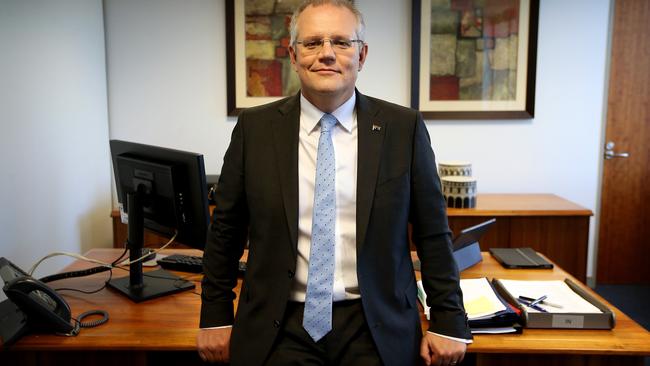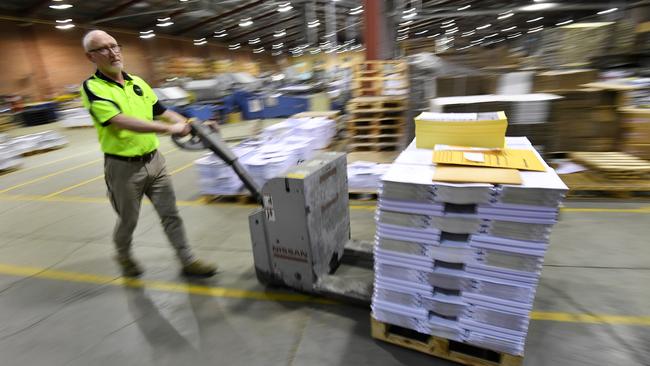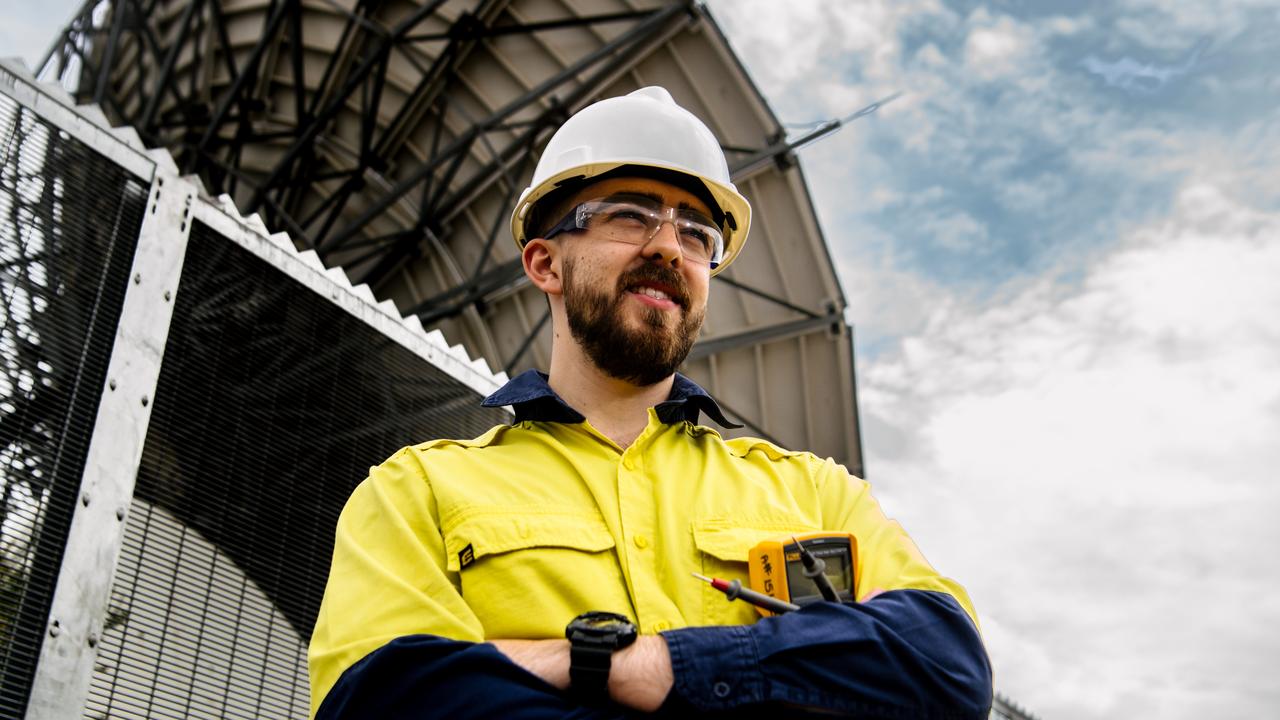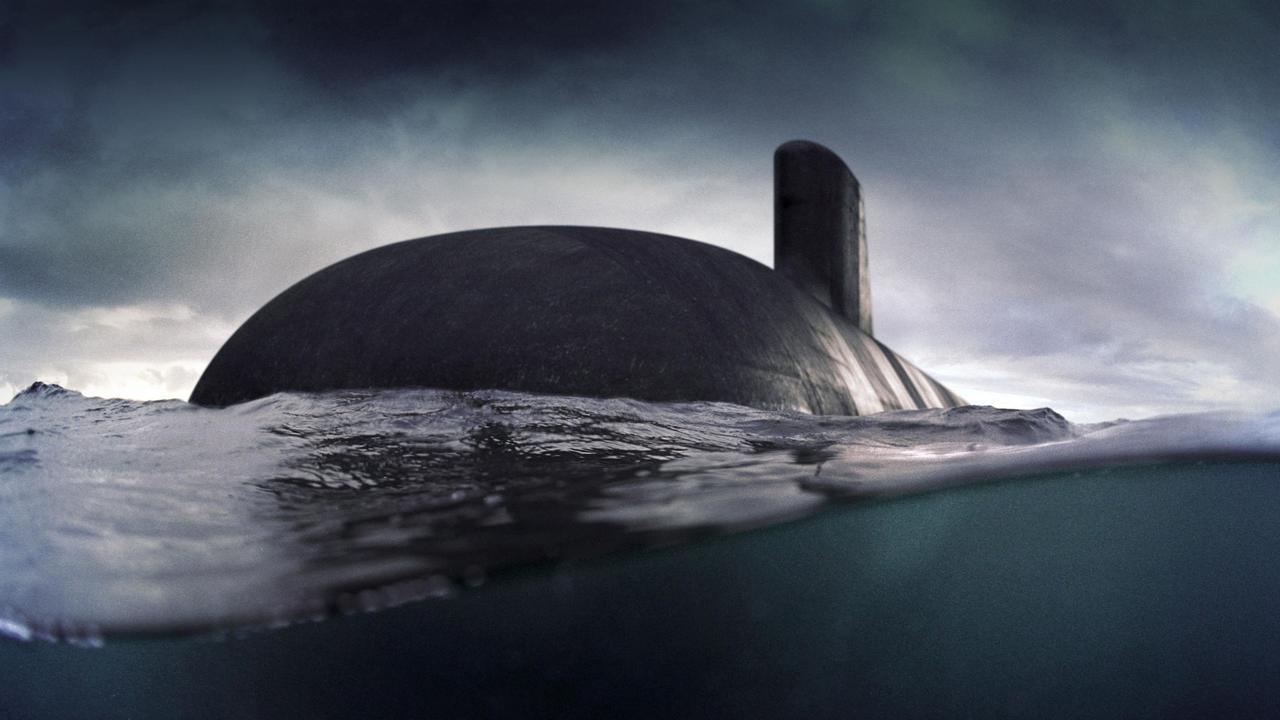Federal Budget 2017: Help on electricity prices, housing and $100 million for after Holden closes in SA
EXCLUSIVE: Budget help is coming on power prices, housing affordability, health and education for SA, and $100 million to help businesses “evolve” once Holden closes, the Federal Government says. WHAT WE KNOW
Jobs SA
Don't miss out on the headlines from Jobs SA. Followed categories will be added to My News.
- The five questions Scott Morrison’s Federal Budget should answer
- University degrees to cost more under Federal funding review
- Adelaide tram network expansion push for Federal Budget
BUDGET assistance on electricity prices, housing affordability, and health and education will help ease pressure on South Australians, along with $100 million to help businesses “evolve” once Holden closes, the Federal Government says.
Treasurer Scott Morrison told The Advertiser that SA faces significant cost-of-living challenges, and that Budget measures would start to ease people’s pain and offer hope for the future,
Industry Minister Arthur Sinodinos, who will today announce the post-Holden funding,said that money was a “vote of confidence” in the future of the state.
The 2017-18 Budget is a critical test for the Government, as the deficit heads towards $40 billion. Mr Morrison said “while there have been hard times … when you look around the world, clearly there is a consensus that things are improving” and that nationally the economy had performed well.

“That doesn’t mean everyone in SA has been feeling that personally on the ground. There have been some very significant challenges faced in SA,” he said.
“When you look at the cost of living, particularly (with) electricity, that creates a pretty strong set of pressures in the state. But we think they’re addressed by this Budget.”
Thanks to a deal struck with SA Senator Nick Xenophon over company tax breaks, the Federal Government has confirmed one-off energy payments for pensioners.
Mr Morrison confirmed yesterday that by June 30, pensioners and veterans could expect $75 for singles and $125 for couples.
He has signalled there will be help in the Budget for housing affordability, which reportedly will include tax breaks to help first homebuyers save a deposit. He has also been focused on the cost of renting. The Government has revealed $19 billion more for schools (but cuts for university) and is expected to unveil more health reforms tomorrow night.
Mr Morrison said with wages languishing, people were more acutely aware of the cost of schools, rent, doctors’ bills, electricity and childcare.
“When you’ve got an economy that hasn’t been performing as well as those eastern states, the acuteness of that is great,” he said, adding that the Budget was “based on three principles; fairness, security and opportunity”.
“The opportunity that we can see is coming, the security around services and cost-of-living pressures, and fairness about how that is achieved,” he explained.
“None of that is possible without a growing economy.”
Asked specifically about any funding for Adelaide’s Adelink tram network, Mr Morrison said the Commonwealth was open to the proposal to expand the network but they were “not in the business of just kicking money out the door”. “We’re in the business of investing,” he said.
The Federal Opposition has promised $500 million for the project if it wins Government, but the Coalition says it will not throw money at projects, and that it’s up to state government to prove their business case.
Senator Sinodinos talked up SA’s research and high-end manufacturing capabilities, pointing to defence work and medical innovation, as he announced the manufacturing package to help SA recover from the end of the carmaking industry.

The Advanced Manufacturing Fund will include money to help businesses upgrade their processes and equipment; support for research projects in advanced manufacturing; and the establishment of Innovation Labs to help businesses develop.
“What this means for the northern suburbs is that we’re standing with them in the transition that’s going to come,” he said.
“This is a vote of confidence in the future of advanced manufacturing.
“What our package does is linked with the defence industry in the sense we want people to transition to other high-end, high-value jobs.”
Senator Xenophon, who has been pushing the Government to release more funds from the Automotive Transformation Scheme to help companies adjust, said this new fund had the potential to create thousands of jobs to “help cushion the blow of carmaking shutting down”.
“It’s great the Government came on board to support this proposal for the fund. This $100 million will help turbocharge manufacturing in SA and Victoria in areas where it’s needed most,” he said.
“I believe these funds … will pave the way for the government to spend even more on advanced manufacturing because they’ll see a strong economic benefit.”
The State Government has also been calling for more money from the ATS, and yesterday said they wanted a commitment to rebuild the tram network and to help Whyalla.
The Opposition has been attacking the Government over Gonski 2.0 — the new school funding model. They had promised even more money, so they say the $19 billion represents a $22 billion cut.
Education spokeswoman Tanya Plibersek said Prime Minister Malcolm Turnbull was taking from children to give big business a tax cut.
“Public school parents know that the vast majority of public schools will never achieve a fair funding level after these $22 billion of cuts,” she said.
Opposition treasury spokesman Chris Bowen told the ABC yet that the Budget would be “based on the Government adopting pale imitations of Labor policy in an attempt to save Malcolm Turnbull’s leadership”.
Millions to help federal police fight terrorism, organised crime
MILLIONS of dollars will put hundreds more police to work tackling terrorism, organised crime, and gangs.
Prime Minister Malcolm Turnbull will today announce an extra $321 million for the Australian Federal Police, aimed at boosting national security.
Another 300 AFP personnel will include bomb response technicians, police negotiators, spies, crime scene investigators and weapons experts.
The money will be delivered over four years to “equip the AFP with new capabilities and greater flexibility to respond rapidly to emerging crimes today, and into the future”, Justice Minister Michael Keenan said.
“This represents the largest single funding boost for the AFP’s domestic policing capabilities in a decade, reflecting this Government’s unwavering commitment to the AFP and keeping Australians safe,” he said.
“The funding will provide for an additional 100 intelligence experts, over 100 tactical response and covert surveillance operators, and almost 100 forensic specialists to advance our fight against crime and terrorism.
“The additional experts will fast-track investigations and lock up criminals sooner, targeting areas of priority including terrorism, criminal gangs, drugs, organised crime, cybercrime, fraud and anti-corruption.”
Mr Keenan said the funding was the “first step” in a ten-year plan for the organisation.
“The Turnbull Government is committed to ensuring the AFP continues to have every resource and capability necessary to protect our nation and our way of life,” he said.
Earlier this year, AFP Commissioner Andrew Colvin warned of “substantial” cutbacks to policing if there was no extra funding. He was particularly concerned about police squads that target gangs and gun crime, telling Parliament he would have to prioritise after previous funding cuts.
The then-Labor Government had introduced an “efficiency dividend” across government departments including the AFP, the Australian Security Intelligence Organisation and the Australian Secret Intelligence Service.
Sweeteners for living organ donors
LIVING organ donors are “desperately needed”, the Federal Government says, as it pledges to support people who choose to give “the gift of life”.
Tomorrow’s Budget will include $4.1 million to expand the Supporting Leave for Living Organ Donors Program. Donors will now be able to claim back out-of-pocket expenses as well as receiving up to nine weeks’ paid leave while they are recovering from the major surgery required for living organ donation.
Health Minister Greg Hunt said rates of living organ donation — mostly kidney donation — have gone down by almost 20 per cent, while the need for kidneys would increase with the age of the population and the rates of diabetes and obesity.
“More living kidney donors are desperately needed — and this initiative is an important way to help meet this need,” he said.
“Approximately 1000 Australians are on the kidney transplant waiting list and 12,000 Australians are on haemodialysis at any given time.
“With more organs being donated, fewer transplant recipients will require dialysis.”
Mr Hunt said increasing the rates of organs donation would improve people’s quality of life, but would also reduce the burden on the health system.
“These people give the gift of life and the Turnbull Government is supporting them by ensuring that cost is no barrier to donating a kidney or part of their liver,” he said.
“The Turnbull Government has previously extended the amount of leave to be reimbursed from six to nine weeks, at the rate of the national minimum wage.”
Funding for the paid leave was due to run out in June, but will now be extended for another four years.
About 1500 living Australians have donated a kidney.
The Sunday Mail revealed last year that a shortage of organs had driven almost 100 Australians overseas to buy kidneys.
The Federal Budget — What we know so far
Treasurer Scott Morrison
ON SA
“When you’ve got an economy that hasn’t been performing as well as those eastern states, the acuteness of (housing affordability) is great.”
ON THE BUDGET
“It’s based on three principles; fairness, security and opportunity.”
ON INFRASTRUCTURE
“We invest in proven projects and Adelink has the case to make and the Commonwealth has shown a real openness to it.”
ON DEFENCE
“In last year’s Budget, SA featured prominently with the defence program ... an enormous amount of progress has been made.”
HEALTH
— $68 million for Australia’s first lifesaving Proton Beam Therapy facility, to open in Adelaide in 2020.
— Some medicines will be cheaper for patients and Government will save $1.8 billion through a price deal with the pharmaceutical industry and a new system which encourages doctors to prescribe generics.
— Chemists to get taxpayer funding to compensate for lower prescription volumes and $600 million for in-pharmacy diabetes checks.
— The Medicare rebate for specialist consultations will rise in 2018, but the rebates for specialist procedures won’t be indexed until 2019.
— High-income earners could be required to pay a higher Medicare Levy or Medicare Levy Surcharge.
- $4.1 million to support living organ donors.
EDUCATION
— Gonski 2.0 — otherwise known as Quality Schools — will inject an extra $19 billion into schools over the next decade. Almost all schools will be better off, with average spending growing more than four per cent a year.
— A national agreement with the states which ensures all four-year-olds have access to 15 hours of preschool per week will be extended until the end of next year at a cost of $428 million.
— Legislating ongoing support for the $592 million Higher Education Participation, which includes giving universities $985 for each disadvantaged student they enrol and creating a performance funding pool ($13.3 million per year) for universities that improve their average success rates for poor or indigenous students.
— $2.8 billion in savings through increasing the maximum student university fees by 1.8 per cent each year between 2018 and 2021, leading to a 7.5 per cent increase, lowering the starting repayment income threshold for loans to $42,000, restricting subsidies to Australian citizens and imposing a 2.5 per cent efficiency dividend in 2018 and 2019.
WELFARE and FAMILIES
— Under a deal with the Nick Xenophon Team, the Government will spend $370 million on one-off benefits to help pensioners and parent payment recipients pay their power bills. Singles will receive $75 and couples $125.
— Loopholes in welfare rules used by some unemployed to avoid participating in work-for-the-dole or attending job interviews will be tightened. Those who fail to turn up to appointments without a valid excuse will have their payments suspended for up to eight weeks.
— Parents who refuse to have their children immunised will lose $28 per fortnight in family payments. A previous penalty, which saw anti-vaccination parents lose $726 in end-of-year “supplement” payments, will be scrapped.
— The Government has shelved $5 billion worth of cuts to family tax benefits, which were facing defeat in the Senate.
HOUSING
— Aspiring first home buyers to be able to deposit a capped amount of their pre-tax income into special accounts to save for deposits.
— A proposal to allow first home buyers to cash out some of their superannuation for deposits has been dumped.
— Retirees who want to “downsize” could be permitted to deposit some of the proceeds of a family home sale tax-free into their super.
— Extra support is expected to help community housing organisations buy more low-cost properties.
INDUSTRY
— $100 million to help businesses in SA and Victoria transition to advanced manufacturing once Holden closes.
INFRASTRUCTURE
— The budget will include $50 billion for infrastructure projects.
— State Governments seeking funding for projects will have to demonstrate what returns will be available for investors. This could include the imposition of tolls on federally-funded roads
— Funding for new Western Sydney airport.
FINANCES
— Debt will be allocated in the budget against the Government departments responsible for accruing it.
— The budget will distinguish between money borrowed for capital projects (“good debt”) and for ongoing expenses (“bad debt”).
— Budget watchers Access Economics have predicted the deficit will be $38.3 billion for 2016/17 and (in the absence of policy changes) $20.9 billion in 2018-19.
IMMIGRATION
— Savings expected from the planned closure of Manus Island Immigration detention centre.
MEDIA
— Gambling ads to be banned during live sporting broadcasts before 830pm.
— Annual licence fees for free-to-air TV and radio stations to be scrapped, saving station owners about $130 million.
— New spectrum fees for broadcasters to raise about $40 million
— Reduction in the number of sporting fixtures on the “anti-siphoning” list which must be shown on free-to-air TV.
— $30 million in funding to help subscription TV maintain and increase coverage of women’s sports, niche sports and high-participation sports that are less sustainable to broadcast
— Review of Australian and children’s screen content.
— “Two out-of-three” and “75 per cent audience reach” rules for media owners to be repealed.
POLICE
— $321 million for the Australian Federal Police to fight terrorism, cybercrime, gangs and organised crime.
VETERANS
— $133 million for veterans exposed to radiation during nuclear bomb testing in WA and SA.


